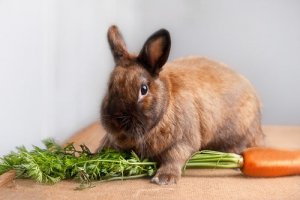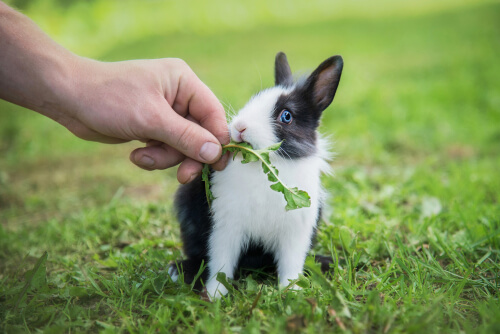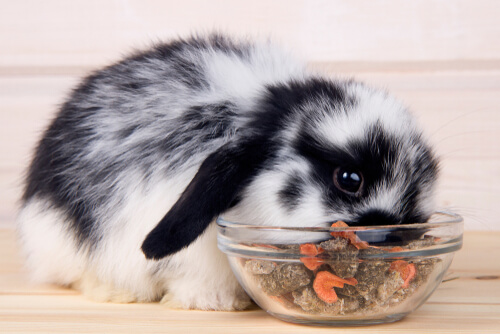Rabbit Care: What to Feed Your Dwarf Rabbit

Owning a pet means making sure you meet their every need. When it comes to owning rabbits, a healthy, balanced diet is essential for their care and well-being. So, in today’s article, we want to give you some advice on what to feed your dwarf rabbit.
What do dwarf rabbits eat?
This is one of the questions new rabbit owners ask most, and is often a source of great worry and confusion. While feeding rabbits isn’t actually all that complicated, there are a great many myths and misconceptions surrounding their diet.
It can take anywhere between 12 and 15 hours for food to pass through a rabbit’s digestive system, which is why experts recommend feeding them small portions of food throughout the day.
A dwarf rabbit’s diet should be made up of forage and small portions of fruit or veg every day. Fresh food shouldn’t be left in their hutch or enclosure for more than 24 hours, so that it doesn’t spoil. It’s also best to give them food at room temperature, rather than straight out of the fridge. And never, under any circumstances, should you ever feed your rabbit junk food or chocolate.
Make sure your rabbits always have access to fresh water, and be sure to clean their water bowl or bottle every day.
What to feed a baby dwarf rabbit
Regardless of their size, rabbits are considered “babies” up until around nine months old. Over the first few months, you can gradually introduce new types of food, and slowly increase the portion sizes.

Between 2 and 4 months, young rabbits will mainly eat hay. Hay is rich in fiber, and will help keep their teeth and guts healthy. You can also feed them pellets specially designed for young rabbits. Don’t feed them cereals, as they contain large amounts of fat.
Once they’ve reached approximately 3 or 4 months old, you can start to introduce small quantities of vegetables to your rabbit’s diet. Start by giving them a small piece of a suitable vegetable twice a week, then slowly increase to two portions in 48 hours. This will help avoid digestive issues such as diarrhea.
Up until 9 months old, your dwarf rabbit should eat hay, with 3 or 4 teaspoons of pellets, and a small portion of vegetables every day. Fruit should only be given as a treat, a maximum of twice a week.
What to feed an adult dwarf rabbit
Experts recommend reducing the number of pellets and increasing the amount of forage as your rabbit gets older. In fact, adult rabbits should have unlimited access to hay 24/7. You can also offer your pet small portions of dark, leafy vegetables every day.

The pellets you give your rabbit should be high in fiber, proteins and calcium. You can feed them approximately 25 to 30 grams of pellets per day.
Limit fruit intake to a maximum of twice a week. Fruit is very high in sugar, and can be bad for their health. Vary the types of fruit you give your rabbit as it grows up so that it gets used to different tastes and textures.
What can you feed your dwarf rabbit?
Hay should form the basis of any good rabbit diet, and can also be used as part of their bedding. It is essential for a healthy digestive system, and keeping their teeth healthy. Hay comes in many varieties, with some containing additional ingredients to enrich your pet’s diet: flowers, aromatic herbs, wild fruit, carrot… The idea is to vary your pet’s diet so it doesn’t get bored.
Although you can continue to give your dwarf rabbit small quantities of pellets as it gets older, it’s best to avoid those that contain colorants and cereals. A vet will be able to advise you as to which brand is best.
Not all vegetables are suitable for rabbits, so it’s important to choose carefully. Experts generally recommend the following: spinach, carrot tops, beetroot, basil, celery, asparagus, broccoli, chard, kale, and arugula.
When it comes to fruits, you can feed your rabbit: cherries, kiwi, papaya, peach, strawberry, apple, pineapple, melon and watermelon.
It’s also important to be aware of the foods that aren’t suitable for rabbits: oats, dairy products, pulses, sugary foods, sweets, fried foods, nuts, cat or dog food, nightshade, potato and other human food (with the exception of the above fruit and veg).
Finally, if you’re going to make any changes to your rabbit’s diet, be sure to do it gradually. Sudden dietary changes can be extremely detrimental to your pet’s health.
Owning a pet means making sure you meet their every need. When it comes to owning rabbits, a healthy, balanced diet is essential for their care and well-being. So, in today’s article, we want to give you some advice on what to feed your dwarf rabbit.
What do dwarf rabbits eat?
This is one of the questions new rabbit owners ask most, and is often a source of great worry and confusion. While feeding rabbits isn’t actually all that complicated, there are a great many myths and misconceptions surrounding their diet.
It can take anywhere between 12 and 15 hours for food to pass through a rabbit’s digestive system, which is why experts recommend feeding them small portions of food throughout the day.
A dwarf rabbit’s diet should be made up of forage and small portions of fruit or veg every day. Fresh food shouldn’t be left in their hutch or enclosure for more than 24 hours, so that it doesn’t spoil. It’s also best to give them food at room temperature, rather than straight out of the fridge. And never, under any circumstances, should you ever feed your rabbit junk food or chocolate.
Make sure your rabbits always have access to fresh water, and be sure to clean their water bowl or bottle every day.
What to feed a baby dwarf rabbit
Regardless of their size, rabbits are considered “babies” up until around nine months old. Over the first few months, you can gradually introduce new types of food, and slowly increase the portion sizes.

Between 2 and 4 months, young rabbits will mainly eat hay. Hay is rich in fiber, and will help keep their teeth and guts healthy. You can also feed them pellets specially designed for young rabbits. Don’t feed them cereals, as they contain large amounts of fat.
Once they’ve reached approximately 3 or 4 months old, you can start to introduce small quantities of vegetables to your rabbit’s diet. Start by giving them a small piece of a suitable vegetable twice a week, then slowly increase to two portions in 48 hours. This will help avoid digestive issues such as diarrhea.
Up until 9 months old, your dwarf rabbit should eat hay, with 3 or 4 teaspoons of pellets, and a small portion of vegetables every day. Fruit should only be given as a treat, a maximum of twice a week.
What to feed an adult dwarf rabbit
Experts recommend reducing the number of pellets and increasing the amount of forage as your rabbit gets older. In fact, adult rabbits should have unlimited access to hay 24/7. You can also offer your pet small portions of dark, leafy vegetables every day.

The pellets you give your rabbit should be high in fiber, proteins and calcium. You can feed them approximately 25 to 30 grams of pellets per day.
Limit fruit intake to a maximum of twice a week. Fruit is very high in sugar, and can be bad for their health. Vary the types of fruit you give your rabbit as it grows up so that it gets used to different tastes and textures.
What can you feed your dwarf rabbit?
Hay should form the basis of any good rabbit diet, and can also be used as part of their bedding. It is essential for a healthy digestive system, and keeping their teeth healthy. Hay comes in many varieties, with some containing additional ingredients to enrich your pet’s diet: flowers, aromatic herbs, wild fruit, carrot… The idea is to vary your pet’s diet so it doesn’t get bored.
Although you can continue to give your dwarf rabbit small quantities of pellets as it gets older, it’s best to avoid those that contain colorants and cereals. A vet will be able to advise you as to which brand is best.
Not all vegetables are suitable for rabbits, so it’s important to choose carefully. Experts generally recommend the following: spinach, carrot tops, beetroot, basil, celery, asparagus, broccoli, chard, kale, and arugula.
When it comes to fruits, you can feed your rabbit: cherries, kiwi, papaya, peach, strawberry, apple, pineapple, melon and watermelon.
It’s also important to be aware of the foods that aren’t suitable for rabbits: oats, dairy products, pulses, sugary foods, sweets, fried foods, nuts, cat or dog food, nightshade, potato and other human food (with the exception of the above fruit and veg).
Finally, if you’re going to make any changes to your rabbit’s diet, be sure to do it gradually. Sudden dietary changes can be extremely detrimental to your pet’s health.
This text is provided for informational purposes only and does not replace consultation with a professional. If in doubt, consult your specialist.








